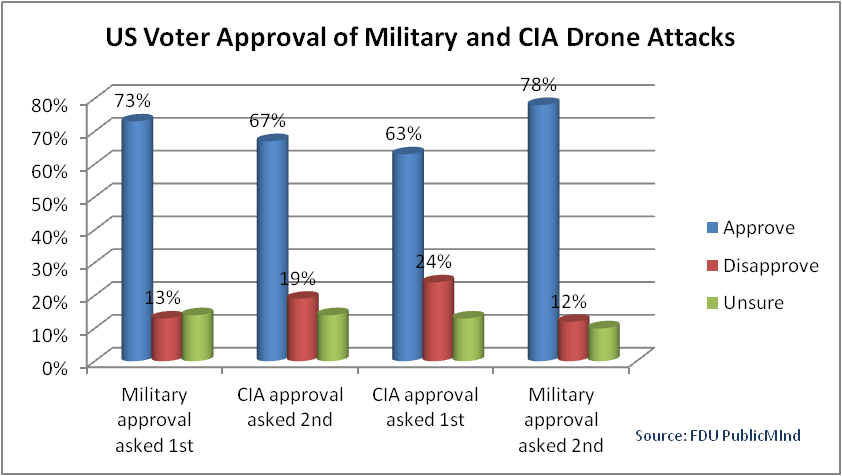
American public opinion of drone warfare is more complex and conflicted than top-line results suggest. First, voters make a distinction between targeting foreign nationals and targeting American citizens. Second, a significant portion of voters make a distinction between the military carrying out such strikes and the CIA having the same latitude.
True, voters offer broad support for the idea of using unmanned aircraft to surveil and target people abroad who are considered a serious threat to the US. A recent Huffington Post/You Gov measurement is typical, showing 61 percent of registered voters approve and 18 percent disapprove, similar to results in a Pew poll last summer which pegged approval among US adults at 62 percent and disapproval at 28 percent.
But there is more to US opinion than these broad approvals. Asked straight out in a Fairleigh Dickinson University study whether drones can (not "should," but "can") legally target American citizens abroad, by a two-to-one margin voters think no, that it must be illegal. About half say it is not legal, while just a quarter think it is legal, and another quarter say they aren't sure.
It is worth remarking on because voters' gut reaction is at odds with the Obama Administration's position. The President has endorsed the idea that America's defense needs include the ability to snuff out threats abroad even from US citizens, and that who qualifies as a threat may be broadly interpreted, and that determination does not involve the courts.
Voters' gut reaction to the question of legally killing US citizens also conflicts with their own broad, approval of drone warfare. The conflict suggests that voters' approval of drone warfare generally does not take into account that a drone target may be a citizen, and that slecting targets is strictly a bureaucratic process, exclusively housed in the executive branch.
Another distinction highlighted in the recent FDU poll, and endorsed by the CIA's new chief, John O. Brennan, is between the military carrying out drone attacks and the CIA having the same authority. Voters approve broadly of both, but there is a portion of voters who draw a line between the two and think the CIA should not carrying out targeted killings.
In the FDU measurements, 75 percent say they approve of the military carrying out such strikes, but 65 percent approve of the CIA doing the same. The 10 point difference lies outside the margin of error. But more clues are found in asking these two approval questions in random order, one priming the other.
If approval of the military carrying out such strikes is asked first, then CIA approval, though lower, lags just 8 points behind the military's approval. But asked first whether they approve of the CIA carrying out such attacks, without the benefit of thinking about the military carrying out such strikes, voters' approval of the CIA's drone attacks lags 15 points behind their approval of the military-directed attacks.

Certainly, for many voters, a drone attack is a drone attack, just a terrorist is a terrorist. But for some, not only does the target matter, but the organization doing the targeting matters. They prefer that the US military pull the trigger, rather than the Central Intelligence Agency.
Another nuance worth tracking is how much voters know about the drone programs. Americans are generally aware that this kind of remote targeting is going on, yet in the FDU poll 15 percent of voters say they have heard nothing about drone warfare, while 21 percent say they've heard "just a little."
Until recently at least, the drone program has been off to the side in the war on terror, especially since there were many US boots on the ground in Iraq and Afghanistan attracting attention. Voters were aware of it but, not surprisingly, not aware of the details. If they get more information, then their overall views on the program may change significantly.
For now, at least, a clear majority of voters endorses fighting by drones. But there is more to it, and therefore possibly less to voters' approval rating of drone warfare, than meets the eye.